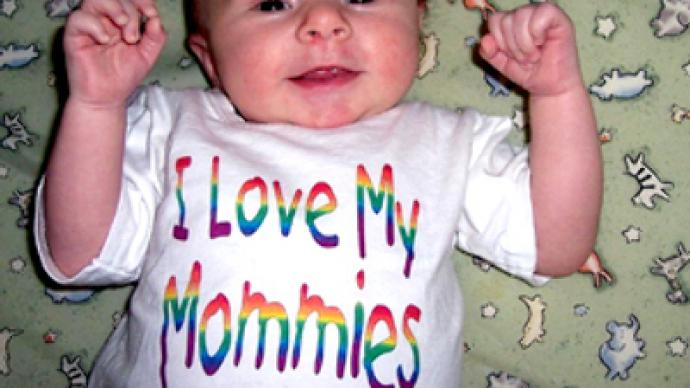Maybe gaybe baby?

A baby born of two natural mothers is the first of its kind in Spain. Will this medical precedent in a country steeped in traditional values help bring about a very modern trend in European family forms?
In moves unprecedented, Spain is shedding its strict Roman Catholic values and approach to make way for one of the most liberal fertility treatments in Europe. This isn’t the only liberal movement to come out of Spain in recent time.
The legalization of same-sex marriage, including giving gay couples the right to adoption, was successfully passed in 2005 despite strong opposition from Roman-Catholic associations. Spain is now one of the most liberal nations in existence.
With these refreshingly “cosmopolitan” attitudes firmly in place, the birth of Spain's first same-sex baby this month was not as controversial as it might have been years ago.
The baby girl, born on 2nd of August,named Lluna, is the first baby in Spain whose parents are both legally recognized as the baby's mothers. 38-year-old Monica Catalia was impregnated from a donated egg from her civil partner, 31-year-old Veronica Bolufer and a sperm donor from a fertility clinic in Valencia.
Whilst the procedure is legal in Spain, the married couple had to win permission from a court to both qualify for the title of “mother” to their child. Fernado Marina, director of the Cefer clinic in Valencia which carried out the treatment talked about the medical procedure:
“It's surprising, but it really isn’t a complicated process. The egg was removed from Veronica and implanted in the uterus of Monica. We used in vitro fertilisation with sperm from an anonymous donor. The baby was biologically generated by two women and a man. It’s a historical precedent. It opens up a great opportunity for all gay women.” Marina said on Ukparentslounge.com.
Unlike most European countries, Spain does not require people requesting fertility treatment to be married. Because of these more relaxed policies together with the fact that the UK implemented a law that insisted all sperm donors had to disclose their identity, Spain has seen an influx of foreigners, particularly from Britain, requiring fertility treatment.
Taking full advantage of the situation, starting June this year, Spain announced package tours allowing lesbian couples to visit Spain and go home either married, pregnant or if they wanted, both. A particularly entrepreneurial travel agency recognized the potential of offering “fertility packages” to British lesbians and teamed up with an equally astute fertility clinic in Alicante. Dr Rafael Bernabeu, founder of the Instituto Bernabeu clinic in Alicante, spoke of his enthusiasm for the “tours” in The Guardian. Bernabeu said:
“We noticed the increase in British women coming to us as soon as the law (in the UK) was changed. We don't ask questions about people's sexuality so can't give exact figures. But often they come as same-sex partners or simply tell us they are lesbians.”
Whilst the procedure that enables two female partners to be biologically and both legally named as the baby's “mothers” may be the first of its kind in Spain, the so-called “Gaybe boom”, whereby children have same-sex parents, has been rapidly growing in America since the Aids crisis in the 1980s and is apparently reshaping American family life.
According to ABCnews.com, there are 270,000 children living with same-sex partners in America. The Williams Institute, an organization dedicated to advancing sexual orientation law and public policy, states that 20 percent of gay couples have children under 18. Naomi Goldberg, a public policy officer at the Williams Institute told ABCnews.com:
“Anecdotally, we are hearing a lot of stories about what has been called the 'gaybe boom', same-sex couples having children.”
Like in Spain, marriages between gay couples are also legal in the US, albeit in only six states. “Gay families” are increasingly being accepted in a predominantly heterosexual society. It was recently announced that next year, America is to take an unprecedented step and include same-sex partners in the census.
In Europe, the “controversial” issue seems to have been less progressive, with Spain and the Netherlands seemingly pioneering the cause. Bringing children up under less “conventional” family surroundings has always been the subject of much debate. Despite harsh opposition, mostly by Roman Catholic factions, 66 percent of Spaniards were in favour of legalizing gay marriages. The right to allow gay couples to have children seems to be equally embraced in this increasingly socially tolerant country. Victoria, a heterosexual woman from the particularly cosmopolitan Alicante region of Spain, is delighted at the courts decision to label both women as Lluna's mother. Victoria said:
“The birth of a baby is always a joyous occasion but when the baby has been conceived in such circumstances and has two doting mothers, it is tremendous and a real landmark in gay rights in Spain.”
In spite of the seemingly widespread approval, there is bound to be opposition and not everybody is as enthusiastic about this contentious issue. Maria Gallardos attends university in Gerona, a less cosmopolitan part of Spain, and has witnessed a lot of abuse and hostility towards homosexual people.
“There is absolutely nothing wrong with homosexuality don't get me wrong, but I have seen what a homophobic place Spain can be, like most places no doubt. I just don't think it is fair putting a child through the amount of bullying it will most definitely be put through.”
Whilst in the US a typically American named “gaybe boom” may be happening, Europe's slowly emerging acceptance of less “conventional” family situations may be just beginning, lead by one of the world’s most conservative, traditional and guarded nations.
Gabrielle Pickard for RT













